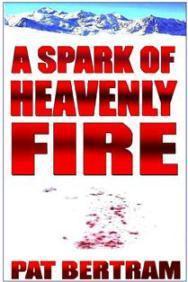Pat Bertram's Blog, page 246
January 18, 2013
Seven by Seven by Seven
 A fellow author tagged me in a game on Facebook the other day where authors were supposed to “Go to either page 7 or 77 of your manuscript. Count down 7 lines, then copy the next 7 lines to your status. Then tag 7 other writers.”
A fellow author tagged me in a game on Facebook the other day where authors were supposed to “Go to either page 7 or 77 of your manuscript. Count down 7 lines, then copy the next 7 lines to your status. Then tag 7 other writers.”
I don’t like tagging people because it seems rude to include them in a game they didn’t ask to play, but still, all those sevens caught my attention, so I thought I’d play out the game here. Feel free to tag along!
He ushered her toward a battered red Honda Accord that looked as if it could have been one of the first models off the assembly line.
“It has close to two hundred thousand miles on it,” he said proudly, opening the door for her.
To her relief, the heater worked.
They headed down the long sweeping driveway.
“Then he met you,” Kerry murmured, “and found contentment once again.”
Bob swallowed. “Yes. After he finished telling me the story of the figurines, he said a consortium of Japanese executives had approached him. They wanted The Lotus Room for a conference center, and he decided to sell it to them. He said his dreams of looking for the gold Buddha had faded, but he wanted to find the remains of his wife and child, and give them a proper burial.”
“We were inept.” He clamped his mouth shut. The challenging assignments in exotic locales he’d expected when he transferred to Teodora Zaroff’s unit had not materialized, and now it looked as though they never would. He’d have been better off staying in Identification; the work was as elementary, but at least he’d be back in the real world where things made sense most of the time.
Once inside, they could barely move around. A folded rollaway bed, a shallow wooden cabinet, a metal desk and chair took up most of the available space.
“A secret room,” Mary breathed. “It’s like something out of Nancy Drew or the Hardy boys.”
“It’s a storage area,” Bill said.
“Then where’s the door?”
***
Pat Bertram is the author of the suspense novels Light Bringer, More Deaths Than One, A Spark of Heavenly Fire, and Daughter Am I. Bertram is also the author of Grief: The Great Yearning, “an exquisite book, wrenching to read, and at the same time full of profound truths.” All Bertram’s books are published by Second Wind Publishing. Connect with Pat on Google+
Tagged: A Spark of Heavenly Fire excerpt, Daughter Am I exerpt, Facebook, Light Bringer excerpt, More Deaths Than One excerpt, page 7 line 7


January 17, 2013
Why Can’t I Plagiarize Myself?
 Yesterday I got spammed by someone trying to sell me software to help me keep from plagiarizing myself. Huh? What’s the big deal? Why can’t I plagiarize myself? Who’s going to sue me if I do so — me?
Yesterday I got spammed by someone trying to sell me software to help me keep from plagiarizing myself. Huh? What’s the big deal? Why can’t I plagiarize myself? Who’s going to sue me if I do so — me?
Coincidentally, I’ve been planning to write a facetious post about plagiarizing myself, thinking to be clever — I mean, really. Self-plagiarism? Is there such a thing? I did a bit of research, and it turns out there is an epidemic of self-plagiarism going on. Successful authors who combine bits and pieces from different articles or previous books into one supposedly new article without citing the original sources. Fiction writers who copy and paste descriptions of characters and places from one novel to the next. Academics who use sections of old papers for new ones. (Called double-dipping.) Researchers who recycle old research into new documents. (Called salami-slicing.) Bloggers who repurpose old posts.
If someone is paying for new articles or new books, either as an editor or a reader, and they get recycled hash, there is a matter of ethics involved. But blogging? Who even cares?
A couple of times I have recycled old posts, and that’s what my facetious confession was supposed to be about — going back to some of my early posts that got a few views when they were first published and none since, updating or adding to them, and posting them as new. Why should my old writings go to waste? I wrote some good pieces that no one read. Why should I have to let such treasures get lost in the depths of the blogging garbage dump? They were my words. I should be able to dig them out and recycle them if I wish.
Sometimes I cut and paste a paragraph or so from a previous post to maintain consistency from post to post, especially if I’m writing about how I felt back then. I’d trust my blog posts more than I’d trust my memory. Is that self-plagiarism?
Occasionally, I’ve sent other bloggers an old post to use as a guest post (they knew it was an old post — in some cases they chose the article themselves). Is that self-plagiarism, too?
In my novels, I have been very careful not to reuse any part of one book in another (except in the case of Light Bringer where I paid homage to More Deaths Than One by letting Bob Stark appear briefly). Readers pick up echoes in books — if writers repeat themselves within a novel, readers sense the echo even if they are not consciously aware of it. And readers can pick up echoes from one novel to the next, which is why I don’t like series — too often, the writers recycle bits from one book to the next and the echoes are deafening.
But blogging? Does anyone really care? There are a handful of people who have read almost all 1111 of my posts, but most people who have stopped by read only a few. So who, besides me, would ever even notice if I repeat a section of a previous post for consistency’s sake or rework one of my first bloggeries?
Still, now that I’m aware of the problem, if ever I rewrite an old post, I will either link to it or mention that it’s a revision. You never know — someday I could get litigious and decide to sue myself, and I couldn’t afford the lawyers since I’d have to foot the bills for both sides of the case.
***
Pat Bertram is the author of the suspense novels Light Bringer, More Deaths Than One, A Spark of Heavenly Fire, and Daughter Am I. Bertram is also the author of Grief: The Great Yearning, “an exquisite book, wrenching to read, and at the same time full of profound truths.” Connect with Pat on Google+
Tagged: double-dipping, plagiarizing myself, recycling blogs, repurposing blogs, salami-slicing, self-plagiarization


January 16, 2013
The Sad Song of Grief
 I started crying at the grocery store yesterday.
I started crying at the grocery store yesterday.
The last time I cried in public was a year and a half ago at that very supermarket, which reminds me of where my deceased life mate/soul mate and I used shop. I don’t often go to this store, but it’s the only place I can get the salad dressing I use. After I picked up the salad dressing bottle, I looked for some other flavors in that same store brand, wondering if I should try something new, and I saw a dressing he liked. It struck me as being unbearably sad, and right there, in the salad dressing aisle, I started to weep.
The tearfulness caught me by surprise, but I should have expected the flare-up because I’ve been struggling with sorrow for the past two weeks. This year was the third New Year since his death, and inexplicably it began with tears. Grief had been leaving me alone, and I hadn’t had a strong upsurge for a long time — I thought I was through with grief, to be honest — but when the calendar rolled over from 2012 to 2013, grief came calling once again.
This new phase of grief is different from all the others. There is no great pain, no bewilderment, no shattered heart, but sorrow is always with me like a sad song playing in the background of my life. I don’t notice it all the time or pay much attention to it, but still, it’s there.
Last night I watched A League of Their Own (the version he taped, where he cut out the bickering between the two sisters to make it more of a baseball movie) and it affected me more than I thought it would. When one girl got a telegram about her husband dying in the war, I realized that never again would I have to deal with the horrendous shock and sorrow of seeing my mate die, and when Bill Pullman came back from the war, I realized never again in this life would I have such a reunion with my mate. And Madonna’s “Playground” at the end about tore me up.
This used to be our playground (used to be)
This used to be our childhood dream
This used to be the place we ran to
I wish you were standing here with me
It dawned on me then that this latest version of grief feels like sorrow for the end of childhood. I am a long way past childhood, but there was an innocence to our relationship, a belief that no matter how bad things got, we would survive because we had each other. As I discovered though, my love for him couldn’t make him well, couldn’t take away a moment of his pain, couldn’t keep him from dying. The innocent belief that love conquers all, the belief in “us,” is destroyed forever, and I will never get it back, not until I’m dead, too.
It’s ironic — so much was destroyed by his death, but the one thing I thought would be destroyed (me) is still going strong. Sad, but strong.
I got through everything else grief has thrown at me, and I’ll get through this sad song, too. Just, apparently, not yet.
***
Pat Bertram is the author of the suspense novels Light Bringer, More Deaths Than One, A Spark of Heavenly Fire, and Daughter Am I. Bertram is also the author of Grief: The Great Yearning, “an exquisite book, wrenching to read, and at the same time full of profound truths.” Connect with Pat on Google+
Tagged: A League of Their Own, end of childhood, end of innocence, grief and New Years, love conquers all, Madonna, Playground


January 15, 2013
Meet Rami Ungar
If you’ve read this blog at all during the past five months, you’ve probably noticed the name Rami Ungar, a writer who has been a daily commenter. Well, now you can learn more about Rami and his writings because I’ve interviewed him for my author blog Pat Bertram Introduces . . . Here is an excerpt from the interview:
 Hi, Rami. Good to talk to you! What is your book called?
Hi, Rami. Good to talk to you! What is your book called?
It’s “The Quiet Game: Five Tales To Chill Your Bones”, and it’ll be available later this year as an e-book.
Have you always wanted to be a writer?
At least since I first read “Harry Potter”, though I didn’t realize it till I was around ten or so. At that age you want to be a scientist, a superhero, a firefighter, President. But at ten I realized I wanted to write, and I’ve been writing since.
What writer influenced you the most?
I’d have to say Anne Rice, Stephen King, and James Patterson. I discovered the first two when I was in junior high and high school, and they blew my mind. I knew after reading them, horror was what I wanted to focus on. I discovered James Patterson shortly before graduating high school, and I think he was the one who taught me how to write thrillers. To this day, I think of Alex Cross and James Patterson when I think about how I was able to write my thriller novel “Snake”.
How long did it take you to write your book?
I spent about a week for every short story, so about five weeks. Each story had its own challenges in writing it, but I enjoyed writing each and every one of them. I hope people enjoy reading them as much as I enjoyed writing them.
How long had the idea of your book been developing before you began to write the story?
I basically collected a bunch of ideas that popped into my mind all of the Fall 2012 semester, wrote them down, and then picked the five best ones out of those ideas and worked on them over winter break. I was really surprised how easily some of these short stories came to me, like “Addict”, which is about a guy trying to recover from a sex and porn addiction. I managed to get that one typed out in a day, a record for me with short stories.
Tagged: Anne Rice, influential writers, Inspiration, Rami Ungar, The Quiet Game: Five Tales To Chill Your Bones, the writing process


January 14, 2013
Come See My Etchings!
I couldn’t resist using the old come-on line for the title of this article, but etchings I’m referring to aren’t my etchings. They are the work of Mickey Hoffman, a talented artist and author. (She wrote the mysteries School of Lies and Deadly Traffic, published by Second Wind Publishing.) The first etching is one Mickey did of Beijing, and the second is Myanmar.


If you’d like to see how involved the etching process is, check out Mickey’s blog, What the heck is an etching? She shows step-by-step what exactly goes into the making of her etchings.
If you are more interested in travel than in how to make an etching, here are a few of Mickey’s wonderful travel blogs:
Myanmar: Bagan, a City for Dreamers
The Islands and the Death Railway
And while you’re at it, don’t forget to check out Mickey’s books:
SCHOOL OF LIES: by Mickey Hoffman is a funny mystery novel about a dysfunctional public school. http://tinyurl.com/783sq7r
DEADLY TRAFFIC: The local sex trade flourishes and girls are disappearing from Standard High http://tinyurl.com/83crtzh
Tagged: Deadly Traffic, etchings, Mickey Hoffman, Myanmar, School of Lies, Second Wind Publishing

January 13, 2013
Rubicon Ranch: Necropieces — The Story Continues
 Rubicon Ranch is a collaborative and innovative crime series set in the desert community of Rubicon Ranch and is being written online by the authors of Second Wind Publishing. Seven authors, including me, are involved in the current story — Rubicon Ranch: Necropieces.
Rubicon Ranch is a collaborative and innovative crime series set in the desert community of Rubicon Ranch and is being written online by the authors of Second Wind Publishing. Seven authors, including me, are involved in the current story — Rubicon Ranch: Necropieces.
Residents of Rubicon Ranch are finding body parts scattered all over the desert. Who was the victim and why did someone want him so very dead? Everyone in this upscale housing development is hiding something. Everyone has an agenda. Everyone’s life will be different after they have encountered the Rubicon. Rubicon Ranch, that is.
Although some of the characters were introduced in Rubicon Ranch: Riley’s Story, a previous collaboration, Rubicon Ranch: Necropieces is a stand-alone novel. The first chapter will be posted on Monday, June 11, and one chapter will be posted every Monday after that.
We hope you will enjoy seeing the story develop as we write it. Let the mystery continue! Whodunit? No one knows, not even the writers, and we won’t know until the very end!
Chapter 32: Melanie Gray
by Pat Bertram
Melanie trudged along the left side of the highway, facing traffic, the blister on her heel burning with every step. The sun had come out, and the road was now dry, but her shoes and socks remained wet from slogging through the flooded gutters back in Rojo Duro.
After Sheriff Bryan dropped his bombshell—Why did you do it, Melanie?—he had been called away, leaving the question hanging in the air. Two hours later, he still hadn’t returned, but a kid who looked as if he were straight out of the police academy brought her coffee. She had demanded the use of a toilet, and the young deputy ushered her to the lavatory. He wasn’t waiting for her when she finished, so she had simply walked out of the sheriff’s department. No one stopped her.
She’d now been walking for hours, but was still far from Rubicon Ranch. Maybe she should have returned to the interrogation room and waited for the sheriff, but if he still wanted her, he knew where to find her—at home in about seven more hours.
“See what you’ve done to me, Alexander,” she murmured, tears stinging her eyes. “Not only have you left me alone with only a ghost to talk to, you’ve turned me into an escaped prisoner.” Wearily, she scrubbed away the tears. She was sick of crying, sick of Alexander being gone, sick of the way her life was turning out. Once she’d felt strong, like a warrior, capable of anything. And now? Just a tired widow, at the mercy of her emotions.
A vehicle veered off the right lane, and pulled up alongside her.
“Get in,” Sheriff Bryan commanded.
Melanie wanted to refuse, but oncoming traffic gave her little opportunity to assess the matter, and besides, her blistered heel was throbbing with pain.
She scurried around the tan Navigator and slipped into the front seat. The sheriff stomped on the accelerator. The vehicle shot back into the right lane, narrowly averting a head-on collision with a white Subaru.
“Are you always so reckless?” Melanie asked.
“Are you always so reckless? What do you think you’re doing, walking along the highway like that?”
“Going home, where I would have been all day if your thugs hadn’t arrested me.”
“You weren’t under arrest. I just needed to talk to you, and I couldn’t get away.”
She gave him a narrow-eyed look. “So I’m not a suspect? Then why did you tell my publisher I was?”
He grinned. “It got you a bigger advance, didn’t it?”
She slumped in the seat as much as she could against the restraints of the seat belt, and folded her arms across her chest.
“You have to admit,” Sheriff Bryan said in a softer tone than any she had yet heard issuing from his mouth, “you need help.”
Melanie sat up straight and glared at him. “Help? Help? Who says I need help? Is that why you arrested me? To help me?”
“Now that’s the Melanie I know and love.” He must have sensed the indignant response she was about to hurl at him, because he added quickly, “It’s just an expression.”
Melanie dropped her head into her hands. Why did this man keep her so off balance? Was it that her grief made her vulnerable and any attention would send her reeling, or was there something more going on? Either way, she had to get a grip on her emotions. Warrior, she reminded herself.
She took a deep breath and blew it out slowly. “Why did I do . . . what?”
As cryptic as her comment sounded, he didn’t pretend to misunderstand her reference to the question he had asked in the interrogation room.
He sighed as he had done then. “Why did you shut me out when I poured out my heart to you? I was more open to you than I’ve ever been to any other woman. You could have at least told me you understood, even if you weren’t interested.”
She stared at him in total non-comprehension, and though he glanced at her, she couldn’t pick up any clues as to what he was thinking. She could only see herself in the mirrors of his sunglasses. And then all at once she understood.
During the investigation into little Riley’s murder, the sheriff had taken her to lunch and told her his story. How he’d been the fair-haired boy. President of his class in high school. Pledged the best fraternity in college. Dated a cheerleader and married her after graduation. Went into law enforcement. Hired on at the Greene City Police Department. Became a detective. Got his masters. Went up through the ranks like a shot. Became the youngest captain in the history of the force. Was on the fast track to becoming Chief of Police when he had an affair with a junior officer on the force.
He’d said that his wife knew about the other woman, that she stayed with him because he was the favorite son of Greene City, but when the affair came to light, he lost his job, his status, and his wife—at least temporarily. He claimed that though he was through with her, she wouldn’t give him a divorce because she still believed that one day he was going to be a major police chief, maybe in LA, and she was waiting to get a piece of that large salary in alimony payments.
What Melanie had taken to be a come-on—his letting her know that even though he was married, he was available—he’d apparently meant as a way of opening up to her. And she had run out on him.
But not because of the supposed come-on. Because of Alexander.
“You lied to me,” she said. “You told me you went to the scene where my husband died and came to the conclusion that it had not been an accident. The cops told me it was a hit and run, that someone had rear-ended the car with such force that Alexander crashed head-on into a concrete abutment, but when I went out the scene right afterwards, I didn’t see anything to indicate that another car was involved, so how could you have seen anything weeks later? It’s possible someone had tampered with the car as Riley said, but the only way to find that out was to investigate the vehicle itself. And you didn’t care enough to check it out.”
“Repeat that.”
“You lied to me,” Melanie said.
The sheriff held up a hand. “Not that. Riley.”
“It’s hearsay.”
“This isn’t a court of law. Just tell me.”
“Supposedly, Riley told Moody that she’d seen someone messing with our car.”
“Did she say who?”
“No. Morris accused me of killing Alexander. He said that Riley told Moody she’d seen me messing with our car. When I asked Moody about it, she told me Riley hadn’t mentioned any name, just that she had seen someone. Moody said she didn’t believe that Riley really saw anyone. But she believed it enough to mention it to her father.”
Melanie waited for the sheriff to say, “Aha! So you’re the one who murdered Morris!” But he didn’t say anything. Just rubbed his chin thoughtfully.
“And since we’re talking about Alexander,” Melanie said, “You never returned his cameras to me. I want them back.”
The sheriff turned his mirrored stare toward Melanie. “Cameras?”
“Yes. All of his cameras were in the car. Six of them. I want them back.”
“There were no cameras.”
“Where are they? They were in the car when he left that day. I put them there myself.”
“Ms. Gray, no matter what else you might think of me, I am a great law officer. I know my job. There was no indication in the report of any officers seeing cameras in the vehicle. And the report does not state that Alexander was rear-ended. It was a merely a surmise by one of the state troopers, and he had no business telling you that. Riley was right. Someone did tamper with your car. Someone very knowledgeable and very skillful. The brake lines were cut and the steering wheel loosened. I suspected that when I checked out the scene of the accident and found no skid marks. The car simply plowed into the abutment at a high speed.”
“Maybe the flex lines were worn through. That happened to me once.”
“The car was new. We sent the vehicle to a lab down the hill since we don’t have an automotive lab up here in the high desert, and I just got the results, which is why I wanted to talk to you today. All four metal brake lines were cut so precisely that when Alexander slammed on the brakes, he instantly lost hydraulic pressure in both the front and rear brakes at the same time. With today’s vehicles, cutting the brakes like that is almost impossible for a professional to do, and completely impossible for an amateur.
Melanie clutched her stomach, feeling the same sort of visceral grief as when she heard that Alexander was dead. Alexander . . . murdered? By a professional killer? An assassin?
“It’s not possible,” she said aloud.
“Alexander must have traveled a long way after his brakes failed—the closest brake fluid stain I found was about a mile and a half from where Alexander went off the road.”
“But supposedly when he died, he was texting a woman he was having an affair with. How could he have been texting her if his brakes broke more than a mile away from where he crashed? Wouldn’t he have dropped the phone and tried to control the car?”
“Yeah. I’m having a problem with that scenario, too. We need to talk to the woman, but the number Alexander was texting is out of service. It feels to me as if the phone with the texts was a plant to make everyone think exactly what the official report said—that Alexander lost control because he was texting while driving.”
Melanie put her hands on her head, trying to still the roiling thoughts. “I can’t deal with this right now. Take me home. Please.”
“I’m sorry,” the sheriff said in a soothing tone that might have been practiced but still managed to sound sincere.
For just a second Melanie wished he would stop the vehicle, put his arms around her, and hold her. “There’s just so much death. Alexander. Riley. Riley’s father. The Petersons. Morris.”
“That’s the other thing I need to talk to you about,” Sheriff Bryan said in his official voice. “Morris.”
***
Pat Bertram is the author of the suspense novels Light Bringer, More Deaths Than One, A Spark of Heavenly Fire, and Daughter Am I. Bertram is also the author of Grief: The Great Yearning, “an exquisite book, wrenching to read, and at the same time full of profound truths.” Connect with Pat on Google+
Tagged: grief and loss, online novel, Rubicon Ranch, Rubicon Ranch Necropieces, Second Wind Publishing


January 12, 2013
Pat Bertram, Author of A Spark of Heavenly Fire
 Reblogged from Pat Bertram Introduces . . .:
Reblogged from Pat Bertram Introduces . . .:

Tell us a little about A Spark of Heavenly Fire.
A Spark of Heavenly Fire tells the story of insomniac Kate Cummings who gathers her courage and strength to find new a new life and a new love when all around her people are dying of a bioengineered disease.
What inspired you to write A Spark of Heavenly Fire?
In…
January 11, 2013
Willpower vs. Won’t Power
 I got spammed by a company that wants me to go to its site and take some sort of psych test to assess my willpower. The comment said their studies show that “when it comes to being disciplined and making healthy lifestyle changes, men tend to have a stronger resolve than women” and that “women may have a little more difficulty staying away from temptation and sticking to healthy habits this year.” Apparently, 46 percent of women rated their willpower as good compared to 61 percent of men.
I got spammed by a company that wants me to go to its site and take some sort of psych test to assess my willpower. The comment said their studies show that “when it comes to being disciplined and making healthy lifestyle changes, men tend to have a stronger resolve than women” and that “women may have a little more difficulty staying away from temptation and sticking to healthy habits this year.” Apparently, 46 percent of women rated their willpower as good compared to 61 percent of men.
Since the company has obviously made up its minds about my determination to stick to my resolve based on my gender, there doesn’t seem much point in following through. But besides that, the study seems dubious.
Their sweeping statements about men and women’s relative resolve was based on approximately 200 self-assessments, which isn’t exactly a “study” but more of a poll. Many things could skew the results. Perhaps men who didn’t have a strong resolve when it came to health resolutions didn’t want to go on record as having a weak resolve and so didn’t respond. Perhaps women are harder on themselves than men are, and see any infraction as a lack of resolution where men let it slough off. Perhaps men overrate themselves. Perhaps women have a better knowledge of themselves. Or perhaps men and women interpret their resolve differently. For example, if someone vows to eat healthier and passes on a second piece of cake when normally they would eat three pieces, that could be interpreted as sticking with their resolve and having willpower.
The poll revealed that “if pressured by a friend to “pig out” (after eating healthily for an entire week), 7% of women would totally give in, 46% would only share some of their friend’s junk food, and 47% would stay disciplined and eat healthy. For men, 8% would give in, 41% would share, and 51% would stay disciplined.” Not exactly a resounding indictment of women or a pat on the back for men. Assuming that the participants in the poll were equally divided between men and women, only four more men than women claimed they would stay disciplined. Which means that almost half of both sexes say they won’t. (The poll didn’t reveal if in fact more men would stay disciplined, only that they said they would.)
New Year’s resolutions are always difficult. By making a big yearly resolution, you’re setting yourself up to fail because it’s very difficult to make a major change all at once and stick with it. For one thing, habit is too strong. For another thing, you have to retrain your family and friends so they don’t pressure you back into your pre-resolve lifestyle. For still another thing, once you’ve broken the resolution, there seems less impetus to re-resolve.
Willpower in action seems more like “won’t power,” — “I won’t eat potato chips. I won’t go off my diet. I won’t sleep in instead of exercising.” For myself, I stay away from “won’t power.” The more I say I won’t do something, the more I want to do it. As for willpower, I think it’s highly overrated. I try to do the right thing for my health most of the time, and if I get side-tracked, I don’t beat myself up for it.
One thing for sure — I won’t go to the spammers site and rate my willpower. And I won’t even need any willpower to stick with that resolution!
***
Pat Bertram is the author of the suspense novels Light Bringer, More Deaths Than One, A Spark of Heavenly Fire, and Daughter Am I. Bertram is also the author of Grief: The Great Yearning, “an exquisite book, wrenching to read, and at the same time full of profound truths.” Connect with Pat on Google+
Tagged: men vs women, new years resolutions, pigging out, sticking with resolutions, willpower


January 10, 2013
30 Second Book Trailer For GRIEF: THE GREAT YEARNING
Grief: The Great Yearning is a finalist in the memoir category for the Sharp Writ Book Awards, and they asked me for a 30 second introduction to the book for their “awards ceremony” video. A couple of days ago I posted a draft of this video and here’s the finished video blurb.
After I put this video together, I realized an interesting coincidence: All the photos were taken in August, around the 15th.
The first photo might look like the desert, but it’s a photo of him in Colorado at the Black Canyon of the Gunnison, a few months before he died. I didn’t even know I had the photo, but I found it in a computer file after he was gone, and it shattered what was left of my heart. It looked as if he’d already been moving away from me toward eternity. Oddly, though I didn’t plan it, the three photos I used in the video were all taken within a few minutes of each other on that excursion. The gnarled tree with the stormy clouds, the profound depth of the canyon, the photo of him looking to eternity all now seem to be signs of my unconscious grief.
The photo on the cover of the book is taken in the very same place, exactly a year earlier. The photo of the two of us together (the only photo ever taken of the two of us together) was taken exactly thirteen years earlier than the three photos. And we met exactly thirty-two years before that last trip to the Black Canyon. I had no idea August was such a significant month for me.
***
Pat Bertram is the author of the suspense novels Light Bringer, More Deaths Than One, A Spark of Heavenly Fire, and Daughter Am I. Bertram is also the author of Grief: The Great Yearning, “an exquisite book, wrenching to read, and at the same time full of profound truths.” Connect with Pat on Google+
Tagged: August, Black Canyon of the Gunnison, Grief: The Great Yearning, Sharp Writ Book Awards, significant month


January 9, 2013
Grief and the Empty Timeline of Death
 My life mate/soul mate died 33 months ago. He was 63 at the time, a few months shy of his 64th birthday. Today, his mother called and during the conversation she mentioned that he would now be 66. This revelation stopped me in my mental tracks. 66?
My life mate/soul mate died 33 months ago. He was 63 at the time, a few months shy of his 64th birthday. Today, his mother called and during the conversation she mentioned that he would now be 66. This revelation stopped me in my mental tracks. 66?
During all these months, not once have I ever stopped to calculate what his age would have been had he lived. It felt as if time stopped when he died — not all time, just his time. And yet, his time continues. The timeline that began with his birth is still going on. When she mentioned his age, I got the mental image of a shadow of his ghost continuing to ride that timeline. Not him, not his spirit (because if he does still exist somewhere, he is outside of time) but simply the shadow of what might have been.
Normally such a thought would have swept me back into grief, but this image (at least for now) has me befuddled.
I’ve been thinking of him as 63 years old. As such, he is still older than I am, but I’ve been wondering how I will feel when I get to the age he was when he died, or later, when I grow older than he ever did. Will I feel foolish as a raddled 86-year-old, still yearning for such youthful-looking man? (The only photo I have of him was taken when he was not yet 50. And as my memories fade, that will be the only image I remember him by.)
And yet, there is his continuing timeline. What is growing older? Well, me, of course. I am aware that I will continue to age, but he will be forever a relatively young 63. Yet something — some shadow of him or his life — continues to grow older.
Or is his just an empty timeline now?
I spent most of last night learning how to use Microsoft Movie Maker and putting together a video blurb of Grief: The Great Yearning. The music piece was supposed to be thirty seconds, and it was, but there were also seven blank seconds on the end of the music clip, so that when the video finished playing, the timeline continued blankly for another seven seconds.
Perhaps it’s the coincidence of the two blank timelines that unsettles me, but I truly do not know how to grasp the concept of his empty timeline. He can’t continue to age, and yet his birthdays will come, year after year.
The emptiness of it all makes me want to weep; yet strangely, I am dry-eyed.
***
Pat Bertram is the author of the suspense novels Light Bringer, More Deaths Than One, A Spark of Heavenly Fire, and Daughter Am I. Bertram is also the author of Grief: The Great Yearning, “an exquisite book, wrenching to read, and at the same time full of profound truths.” Connect with Pat on Google+
Tagged: aging after death, empty timeline, Grief: The Great Yearning, growing older, Microsoft Movie Maker, the dead don't grow older





